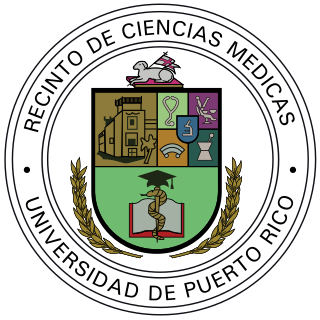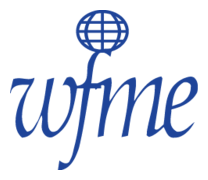Related Research Articles

Health On the Net Foundation (HON) was a Swiss not-for-profit organization based in Geneva which promoted a code of conduct for websites providing health information and offered certificates to those in compliance.

The University of Puerto Rico, Medical Sciences Campus — Universidad de Puerto Rico, Recinto de Ciencias Médicas (UPR-RCM) in Spanish— is a public health sciences-oriented university in San Juan, Puerto Rico. It is part of the University of Puerto Rico System and is located on the grounds of the Puerto Rico Medical Center.

The Sociedade Brasileira de Informática em Saúde, abbreviated as SBIS, is a professional society created in November 1986 in Campinas, during the First Brazilian Congress on Health Informatics. It has the mission of promoting the development and the interchange of ideas and results in the fields devoted to the information technologies applied to the health sciences.
Translational medicine develops the clinical practice applications of the basic science aspects of the biomedical sciences; that is, it translates basic science to applied science in medical practice. It is defined by the European Society for Translational Medicine as "an interdisciplinary branch of the biomedical field supported by three main pillars: benchside, bedside, and community". The goal of translational medicine is to combine disciplines, resources, expertise, and techniques within these pillars to promote enhancements in prevention, diagnosis, and therapies. Accordingly, translational medicine is a highly interdisciplinary field, the primary goal of which is to coalesce assets of various natures within the individual pillars in order to improve the global healthcare system significantly.

The Blue Flag is a certification by the Foundation for Environmental Education (FEE) that a beach, marina, or sustainable boating tourism operator meets its standards. The Blue Flag is a trademark owned by FEE, which is a not-for-profit non-governmental organisation consisting of 65 organisations in 77 member countries.
The University of Medical Sciences is a private medical university in San José, Costa Rica. It is the largest and oldest private medical school in Costa Rica. Currently the main campus is located in the country's capital. The university offers degrees such as Doctor of Medicine, Doctor of Microbiology and Clinical Chemistry, Licentiate of Physiotherapy, Licentiate of Nutrition and Doctor of Pharmacy. UCIMED also offers master's degrees and medical specialties such as a master's degree in Health Management and Specialty in Gynecology and Obstetrics.
Index Medicus (IM) is a curated subset of MEDLINE, which is a bibliographic database of life science and biomedical science information, principally scientific journal articles. From 1879 to 2004, Index Medicus was a comprehensive bibliographic index of such articles in the form of a print index or its onscreen equivalent. Medical history experts have said of Index Medicus that it is “America's greatest contribution to medical knowledge.”
SearchMedica was a series of free medical search engines built by doctors for doctors and other medical professionals, with localized versions for the United Kingdom, the United States, France and Spain.
Hospital accreditation has been defined as “A self-assessment and external peer assessment process used by health care organizations to accurately assess their level of performance in relation to established standards and to implement ways to continuously improve”. Critically, accreditation is not just about standard-setting: there are analytical, counseling and self-improvement dimensions to the process. There are parallel issues in evidence-based medicine, quality assurance and medical ethics, and the reduction of medical error is a key role of the accreditation process. Hospital accreditation is therefore one component in the maintenance of patient safety. However, there is limited and contested evidence supporting the effectiveness of accreditation programs.
Regulation of acupuncture is done by governmental bodies to ensure safe practice.
Health Sciences Online (HSO) is a non-profit online health information resource that launched in December 2008. The website hosts a virtual learning center providing weblinks to a collection of more than 50,000 courses, references, textbooks, guidelines, lectures, presentations, cases, articles, images and videos, available in 42 different languages. The content includes medicine, public health, nursing, pharmacy, dentistry, nutrition, kinesiology and other health sciences resources.

The European Foundation for Quality in eLearning (EFQUEL) was a not-for-profit organisation which was legally established on June 30, 2005, and is based in Brussels, Belgium. It was a worldwide membership network with over 120 member organisations including universities, corporations and national agencies. The purpose of the foundation was to create a European community of users and experts to share experiences of eLearning. Two of the main initiatives of the foundation were the "UNIQUe" accreditation for Quality in e-Learning and the annual EFQUEL Forum.
TheEuropean Union of Medical Specialists is a professional organization of doctors representing medical specialists in the European Union, which was founded in 1958. It is the oldest medical organization in Europe, and represents about 1.6 million medical specialists. It promotes high levels of medical training and practice, to improve and guarantee the highest level of patient care.

RCSI Graduate School of Healthcare Management (GSM) is a non-profit school of healthcare management and medical education based in Dublin, Ireland.

FIBAA is an internationally experiencedagency for quality assurance for programme and system accreditation and certification in higher education. Founded in 1994 by top associations in the Swiss, Austrian, and German business sectors, FIBAA aims to ensure transparency and quality in the education sector. The FIBAA is organized as a non-profit organization. While headquartered in Bonn, North Rhine-Westphalia, Germany, the foundation’s legal seat is in Zurich, Switzerland.
Events in the year 1999 in Spain.

World Federation for Medical Education (WFME) is a non-governmental organisation concerned with education and training of medical doctors worldwide. WFME's main objective is to "enhance the quality of medical education worldwide, with promotion of the highest scientific and ethical standards in medical education". The organisation develops standards for medical education and promotes accreditation of medical schools. It also co-manages the World Directory of Medical Schools.

The National Agency for Quality Assessment and Accreditation is the authorised agency of the Spanish government whose aim is to provide external quality assurance for the Spanish higher education system and to contribute to its constant improvement through evaluation, certification and accreditation.

Vaccine Safety Net (VSN) is a global network of websites aimed at helping people judge the quality of online information on vaccine safety. It was established in 2003 by the World Health Organization (WHO), which had previously set up the independent Global Advisory Committee on Vaccine Safety (GACVS), prompted by concern from public health officials regarding the dissemination of potentially harmful health information via the web. By appraising websites, using credibility and content criteria defined by GACVS, the VSN has been developed to deliver information that is easy to access and up-to-date. As of 2020, the initiative has 89 member sites in 40 countries and 35 languages.
References
- ↑ Mayer MA, Leis A, Ruíz P. Creating a virtual community to improve the quality of health information on the Internet: ten years of experience. Proceedings of the 16th WONCA Europe Conference, Malaga (Spain) 6–9 October 2010, p. 62-3.